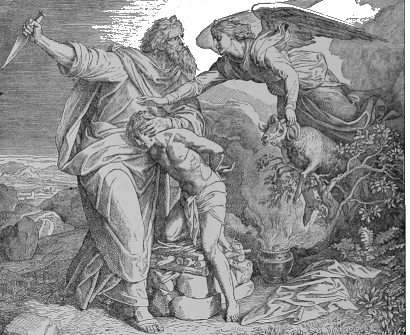The Promise to Abraham and Jesus
© 12.16.18 David Eric Williams
This article appeared in the December 20 edition of the Cottonwood Chronicle
 He has helped his servant Israel and remembered to be merciful. For he made this promise to our ancestors, to Abraham and his children forever (Luke 1:54-55).
He has helped his servant Israel and remembered to be merciful. For he made this promise to our ancestors, to Abraham and his children forever (Luke 1:54-55).
Although most people understand Jesus was not actually born on December 25, it has become universally accepted as a day to celebrate the birth of the Messiah. What is all too often lost in the celebration of Jesus' birth is the fact that his life and ministry were a fulfillment of the covenant promises made to Abraham. In Genesis 12 we read Yahweh's words to Abram where he says, I will bless those who bless you and curse those who treat you with contempt. All the families on earth will be blessed through you (Genesis 12:3). The phrase we want to focus on here is "all the families on earth will be blessed through you." This is what Mary is talking about in her Magnificat.
In the context of the original giving of the promise to Abraham, "blessed" would have been understood as plenty of food, shelter, protection from enemies, justice before the governing authorities and so on. In other words, blessings in the ancient world of the patriarchs were very practical. This is what Mary had in mind as well. Look at Luke 1:51-53 if you're not sure about that. The truth is, nothing has really changed.
Now, this does not suggest the good news of salvation in Jesus Christ is a "health and wealth gospel." Nor does it mean it is a "social gospel" concerned only with improving on society's ills. That kind of teaching – liberation theology – is not taken up with saving people out of the kingdom of darkness but with the redistribution of wealth and other means of rectify perceived injustices.
However, we do need to understand that Jesus Christ did not come to earth just to save souls. He came that we might have life and have life more abundantly. He came to fulfill the covenant promises and to make a way for all people to enjoy the covenant benefits of forgiveness, relation with God - and practical (material) blessings. Thus the apostle Paul says, and now that you belong to Christ, you are the true children of Abraham. You are his heirs, and God's promise to Abraham belongs to you (Galatians 3:29). As true children of Abraham, those who are in Christ enjoy the forgiveness of sins, relationship with God - and the rest of the blessings promised Abraham. Think about it. Throughout the Genesis account, the promises made to Abraham are mostly about things that take place in this material world. That is one of the reasons there has been an ongoing attempt by the more "liberal" arm of the church to define the Good News along purely material and temporal lines. The proper response is not to toss out social justice issues but to understand their place within the gospel message.
The proper place for (social) justice, the meeting of material needs, societal peace and harmony and so on is found in the lives and ministries of people who have been born again. In other words, it is the person who is a new creation in Jesus Christ who is the conduit of kingdom blessings.
As a person brings their life and sphere of influence under the authority of Jesus, they can expect to see the promises made to Abraham realized in their own life. This is most fully apprehended in a corporate sense as communities, regions and nations, come under the authority of the Lord Jesus Christ. This does not mean the church is in charge; it means Jesus Christ is in charge of each individual life and each individual life is expressing a commitment to Jesus by doing all things as unto the Lord. As this happens, the many, many blessings promised to the people of God in Scripture come to fruition.
Entire Site Copyright © 2025 By David Eric Williams










